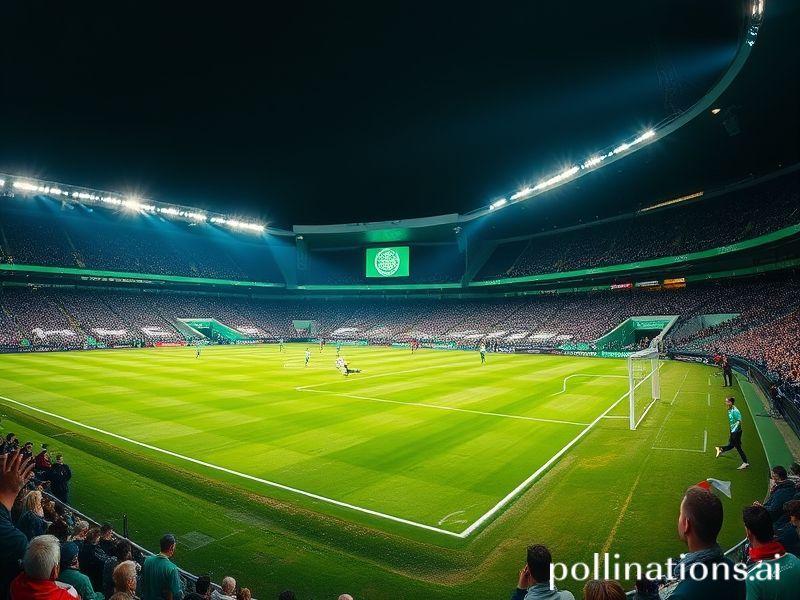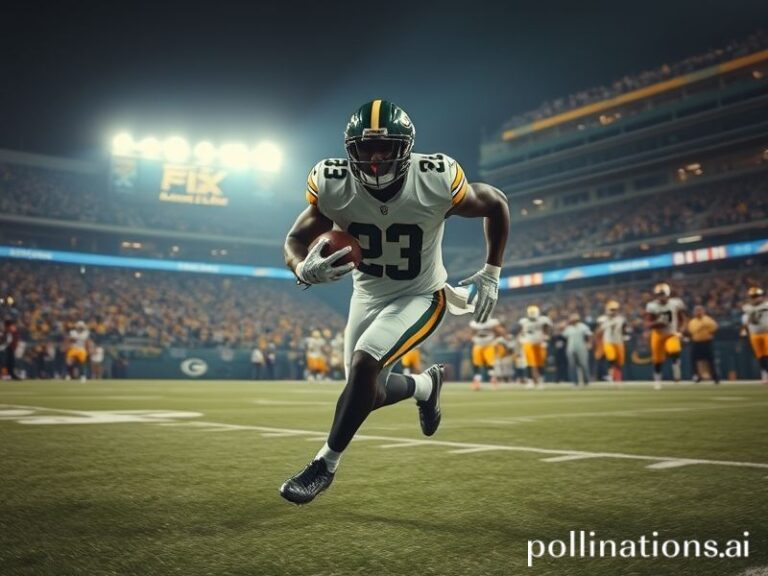Celtic’s 3-1 Win Went Global: How a Routine Scottish Match Became a Dystopian Soft-Power Merch Fest
Celtic’s 3-1 dismissal of Hibernian at Parkhead this afternoon was, on the face of it, a routine domestic chore in a league where the only real suspense is whether the Hoops will secure the title before the clocks change. Yet the match arrived on global screens carrying more geopolitical baggage than a Davos delegate’s suitcase. From Lagos sports bars streaming via dodgy VPNs to Manhattan pubs that open early for “Scottish breakfast and suffering,” today’s fixture doubled as a referendum on soft power, diaspora nostalgia, and the increasingly desperate business of selling anything vaguely “heritage” to a planet that can’t afford rent.
Let us begin with the obvious: Celtic winning in Scotland is about as newsworthy as the Swiss banking another neutrality dividend. Still, the club’s American, Japanese, and (for reasons no one can adequately explain) Australian fan forums lit up as if Putin had just annexed the penalty spot. The goal that sealed it—a 78-minute header from Japanese striker Kyogo—trended from Sapporo to São Paulo, proving that nothing unites humanity like other people’s nationalism wrapped in Nike polyester. In Tokyo, sports-channel talking heads hailed Kyogo as proof that the J-League export model can still penetrate Europe’s closed-shop cartels, conveniently ignoring that Celtic’s majority shareholder is a hedge-fund listed in Delaware.
Meanwhile, in Dublin, publicans reported a 40-percent spike in Guinness sales whenever the green-and-white hoops appear on TV, demonstrating that post-crash Ireland will happily mortgage another generation to German banks so long as someone, somewhere, is singing “The Fields of Athenry” off-key. Over in Toronto, the local Celtic Supporters Club—composed mostly of IT consultants whose last connection to Glasgow was a grandfather who once drank a whisky—live-tweeted through snow flurries and existential dread, offering real-time proof that emigration no longer ends at Ellis Island; it simply relocates to a Zoom room with plaid curtains.
The broader significance? Today’s game was broadcast in 113 countries, outpacing UN Security Council briefings and most TED Talks on sustainable seaweed. That reach translates into real money: shirt sales in Jakarta, betting apps in Nairobi, and a cryptocurrency token—laounced last week—that promises fans “partial ownership of the club’s soul,” currently trading somewhere between a Turkish lira and your will to live. Analysts at Deloitte estimate the global Celtic economy at roughly €300 million, or about what Elon Musk misplaces in the dryer. In an age when nations measure influence in TikTok followers, a Scottish football side with nineteenth-century Irish roots can punch harder than some EU member states, provided nobody asks hard questions about tax arrangements.
Back in Glasgow itself, the city’s cost-of-living catastrophe paused for ninety minutes. Food-bank volunteers confessed they secretly pray for extra-time; it keeps the queues shorter. Local police, ever the optimists, described the post-match atmosphere as “only sporadically apocalyptic,” which Glaswegians understand to mean no flares heavier than 500 grams. Environmental scientists noted that the carbon footprint of 60,000 fans singing about a 1989 championship roughly equals Malta’s annual output, but urged perspective: at least nobody flew to a Super Bowl.
As the whistle blew and Celtic moved four points clear at the top, the world did what it always does—pivoted to the next dopamine hit. Ukrainian soldiers in Kharkiv switched streams to check Bundesliga scores; algorithmic traders in London dumped club-adjacent NFTs; and somewhere in Shanghai, a counterfeit-jersey factory pivoted colors for tomorrow’s Manchester United drop. The beautiful game, after all, is just the free market in shorts, and we are all willing, broke customers.
So the Celtic game today ended 3-1, same as it ever was, yet reverberated through offshore accounts and outmoded national myths alike—reminding us that while history may be tragedy, the rerun is always farce, and the souvenir shirt is 40 percent polyester, 60 percent delusion. Wear it proudly; the planet’s on fire, but at least your team is top of the table.







